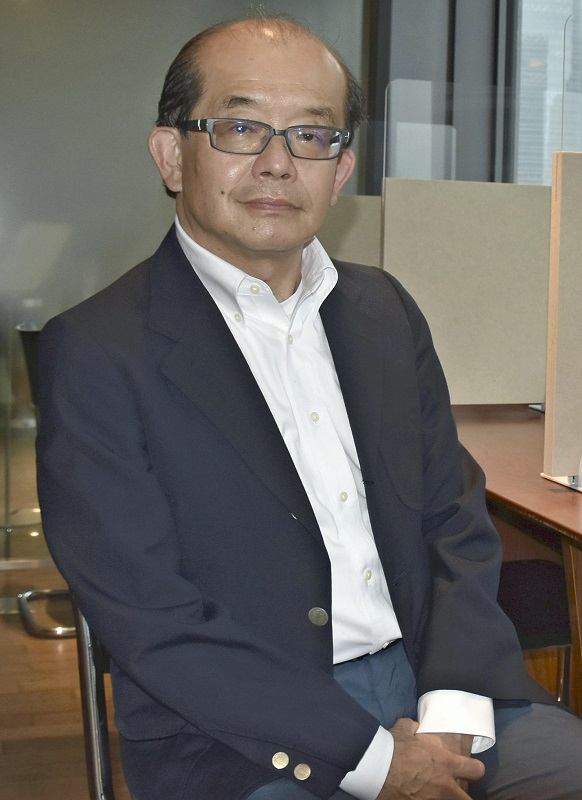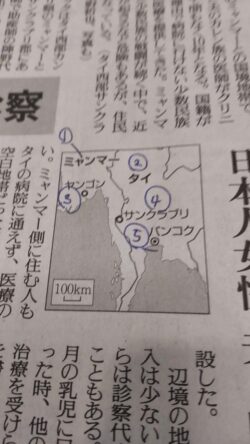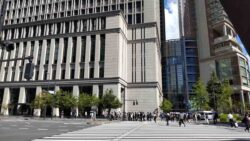ALS patient sets up foundation for united front against disease

Ichiro Hatanaka in Chiyoda Ward, Tokyo
13:39 JST, August 22, 2022
Ichiro Hatanaka, a former employee of the Japan External Trade Organization (JETRO), who was told he had a limited life expectancy after being diagnosed with ALS (amyotrophic lateral sclerosis), has established a foundation to support others fighting the disease.
Hatanaka, 64, of Zushi, Kanagawa Prefecture, has experienced many hardships in his life, such as being caught in civil strife in Africa when he was based overseas for JETRO. He is now facing another trial, but maintains high spirits.
“I may have a limited time, but I want to create an environment where patients and their families can fight the disease positively,” he said.
Born in Kagoshima Prefecture, Hatanaka joined JETRO after graduating from university and was posted to France, Belgium and elsewhere, helping Japanese companies launch overseas operations and develop sales channels.
In 1991, a civil war broke out when he was based in Zaire, now the Democratic Republic of Congo. Areas where foreign nationals lived became targets of looting and shooting. Hatanaka’s residence almost came under attack. “There was a time when I thought I was going to die,” he said.
With the help of the Japanese Embassy, the U.S. military, French troops and others, he managed to escape the strife by crossing the Congo River on a raft. Novelist Yusuke Fukada is said to have incorporated the episode into his thriller “Korai Honryu.”
Three years later, Hatanaka left JETRO and went to the United States to study. Later, he was placed in charge of market development and business revitalization at the Nomura Research Institute, Ltd. and other firms, and in 2006, he started his own company. Last spring, when his business was on track and he was particularly busy, he felt discomfort in his left calf and went to have it examined. He was then diagnosed with ALS, a progressive neurodegenerative disease that affects nerve cells in the brain and spinal cord. Currently, there is no cure for the disease. It is said to affect a handful of individuals out of every 100,000 persons — the number of ALS patients in Japan totaled 10,514 as of the end of fiscal 2020.
Hatanaka was given three to four years to live by his doctor. To slow the progression of the disease, he receives hourlong daily intravenous drips for two weeks each month. He also now needs a cane to walk.
“Why me?” Hatanaka thought, but he increasingly spent time asking himself about what his life so far had meant. Eventually, he decided to help other people in the same situation as himself, considering it his duty to do so.
To establish a foundation, Hatanaka started a crowdfunding campaign, and more than ¥10.5 million was raised for operating expenses from 431 friends and like-minded people. Earlier this month, he finally launched the foundation, called the Future of Humanity Institute, in Chiyoda Ward, Tokyo. The institute provides information to patients and their families, assists in the development of life-support devices that use IT and robot technology, holds events and leases nursing care equipment, among other activities.
Having already been tested by many trials, Hatanaka displays unflinching determination.
“Everything I’ve experienced in my life has been for realizing this mission,” said Hatanaka. “The greatest strength of human beings is to bear the weapon that is hope.”
His 61-year-old wife Itsuko, who was one of his colleagues, said: “My husband was calm even when he was diagnosed as being terminally ill. His life has been full of ups and downs, and I admire his refusal to give up.”
For inquiries about the foundation, email Hatanaka (ichiro@p-als.com).
"Society" POPULAR ARTICLE
JN ACCESS RANKING







